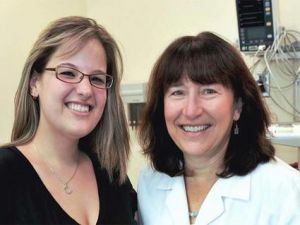Types/aya/zh
Contents
患有癌症的青少年
癌症研究人员,倡导者和癌症幸存者介绍了青春期和年轻成人癌症的话题。
年轻人中的癌症类型
在美国,每年约有70,000年轻人(15至39岁)被诊断出患有癌症,占美国癌症诊断的5%。 这大约是0至14岁儿童被诊断出癌症的六倍。
与成年人或儿童相比,年轻人更有可能被诊断出患有某些癌症,例如霍奇金淋巴瘤,睾丸癌和肉瘤。 但是,特定癌症类型的发生率随年龄而变化。 在15至24岁的人群中,白血病,淋巴瘤,睾丸癌和甲状腺癌是最常见的癌症。 在25至39岁之间,乳腺癌和黑色素瘤最为常见。
有证据表明,青少年和年轻人中的某些癌症可能具有独特的遗传和生物学特征。 研究人员正在努力学习更多有关年轻人癌症的生物学知识,以便他们可以鉴定出对这些癌症可能有效的分子靶向疗法。
青少年和年轻人(AYAs)中最常见的癌症是:
- 生殖细胞肿瘤
- 颅外生殖细胞肿瘤 (童年)
- 肉瘤
在AYA人群中,癌症是与疾病相关的死亡的主要原因。 在2011年的AYA中,只有事故,自杀和杀人案导致的生命多于癌症。
寻找医生和医院
由于年轻人中的癌症很少见,因此必须找到专门治疗您所患癌症类型的肿瘤学家。 研究发现,对于某些类型的癌症,如果采用儿科而非成人治疗方案,则年轻人可能会有更好的结果。
Young adults who have a cancer that typically occurs in children and adolescents, such as brain tumors, leukemia, osteosarcoma, and Ewing sarcoma, may be treated by a pediatric oncologist. These doctors are often affiliated with a hospital that is a member of the Children’s Oncology Group. However, young adults who have cancers that are more common in adults are often treated by a medical oncologist through hospitals that are affiliated with an NCI-Designated Cancer Center or a clinical research network such as NCTN or NCORP.
了解有关寻找医生以及如何获得第二意见的更多信息 寻找医疗保健服务. 当需要做出复杂的医疗决定,有不同的治疗方案可供选择,您患有罕见的癌症或对治疗计划的第一见解来自于没有其他选择的医生时,第二见解可能会特别有用。 专攻或治疗许多患有您所患癌症的年轻人。
治疗选择
您所接受的治疗类型取决于您所患的癌症类型以及癌症的发展程度(其阶段或等级)。 您的年龄,整体健康状况和个人喜好等因素也很重要。
您的治疗选择可能包括临床试验或标准医疗服务。
- 标准医疗(也称为标准护理)是专家认为适合特定疾病并被接受的治疗方法。 从A到Z的癌症清单 了解有关特定类型癌症的治疗信息。您还可以了解有关化学疗法,免疫疗法,放射疗法,干细胞移植,手术和靶向疗法等治疗方法的信息, 治疗类型.
- Clinical trials, also called clinical studies, are carefully controlled research studies that test new ways to treat diseases, such as cancer. Clinical trials are conducted in a series of steps, called phases. Each phase aims to answer specific medical questions. Once a new treatment has been shown to be safe and effective in clinical trials, it may become the standard of care. You can get answers to commonly asked questions about clinical trials and search for clinical trials for the type of cancer you have.
Fertility Preservation Options
It is important to talk with your doctor about how treatment may affect your fertility. Learn about all of your fertility preservation options and see a fertility specialist before starting treatment. Research has found that although discussions of fertility preservation between doctors and young adult cancer patientsExit Disclaimer are becoming more common, improvements are still needed.
Organizations such as MyOncofertility.org and LIVESTRONG Fertilityalso provide fertility-related support and advice to young adults and health care professionals.
Coping and Support
Cancer can create a sense of isolation from your friends and family, who may not understand what you are going through. As a young adult, you may feel like you are losing your independence at a time when you were just starting to gain it. Perhaps you just began college, landed a job, or started a family. A cancer diagnosis puts most people on a rollercoaster of emotions. Because cancer is relatively rare in young adults, you may encounter few patients your age. Moreover, treatment may require hospitalization far from home which can lead to emotional isolation. A desire for normalcy may keep you from sharing your cancer experience with your healthy peers, adding to a sense of isolation.
However, you are not alone. Cancer is treated by a team of experts who address not only the disease but also your emotional and psychological needs. Some hospitals offer comprehensive support programs. Support can come in many forms, including counseling, retreats sponsored by organizations that serve young adults with cancer, and support groups. This support can relieve feelings of isolation and help restore a sense of normalcy.
Young people with cancer say it’s especially helpful to connect with other young people who can offer insights based on their own experiences with cancer.
After Treatment
For many young people, the completion of treatment is something to celebrate. However, this time may also bring new challenges. You may worry that cancer will return or struggle to get used to new routines. Some young people enter this new phase feeling stronger, whereas others are more fragile. Most young people say the transition after treatment took longer and was more challenging than they anticipated. While most of the side effects that you had during treatment will go away, long-term side effects, such as fatigue, may take time to go away. Other side effects, called late effects, may not occur until months or even years after treatment.
Although follow-up care is important for all survivors, it is especially important for young adults. These check-ups can both reassure you and help to prevent and/or treat medical and psychological problems. Some young adults receive follow-up care at the hospital where they were treated, and others see specialists at late effect clinics. Talk with your health care team to learn what follow-up care you should receive and about possible places to receive it.
Two important documents to get written copies of, and to discuss with your doctor, include:
- A treatment summary, with detailed records about your diagnosis and the type(s) of treatment you received.
- A survivorship care plan or follow-up care plan, which addresses both physical and psychological follow-up care that you should receive after cancer treatment. The plan is usually different for each person, depending on the type of cancer and treatment received.
Studies have found that many young adult cancer survivors are often unaware of or underestimate their risk for late effects. Learn more about issues related to survivorship, and questions to ask your doctor, in our follow-up medical care section.
Organizations Serving AYAs
A growing number of organizations serve the needs of AYAs with cancer. Some organizations help young people cope or connect with peers who are going through the same things. Others address topics such as fertility and survivorship. You can also search a range of general emotional, practical, and financial support services in NCI’s list of Organizations That Offer Support Services. You are not alone.
Young Adults
Teens and Adolescents
Coping and Support
Fertility
Survivorship
